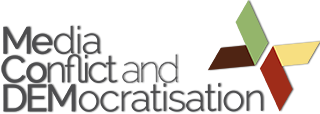An outline of the research design and methodology of Media, Conflict and Democratisation (MeCoDEM) by Katrin Voltmer and Hendrik Kraetzschmar is now available.
Download at: http://www.mecodem.eu/publications/working-papers
Executive Summary
The project Media, Conflict and Democratisation (MeCoDEM) investigates the role of media and communication in processes of regime transformation from authoritarian rule to a more democratic order. This paper outlines the main conceptual considerations and the research design that are guiding the research programme of the project.
- Contrary to the common assumption that democracy provides mechanisms for peaceful conflict resolution, experience shows that many transitions to democracy are characterised by fierce conflicts and even violence. The research of MeCoDEM focuses on these democratisation conflicts, i.e. conflicts that are triggered by and accompany transitions to, or demands for, a more democratic form of government. These conflicts can be understood as communication events that crystallise around the interpretation of events, contested values and the legitimacy of power. We argue that the dynamics of democratisation conflicts and their ultimate outcomes are determined by the way in which they are communicated.
- With their agenda-setting power and their ability to create interpretive frames, the media are key players in transitional contestations. However, the media cannot be understood in isolation. Instead, they are part of a shared, but contested space of – both online and offline – public communication where a multitude of actors compete for attention and recognition: governments and political elites, citizens and civil society groups with different orientations and objectives. This paper presents a communication model of democratisation conflicts that incorporates these various elements.
- The research design of MeCoDEM follows a comparative, multiple case study approach. Research is carried out in four countries, each of which representing particular constellations in democratic development with far-reaching repercussions in their respective regions: Egypt, Kenya, Serbia and South Africa. In each of these countries we study three conflict cases that illuminate key dilemmas of democratic transition: (1) conflicts over citizenship and identity; (2) conflicts over the distribution and control of power and good governance; (3) elections and their potential of exacerbating existing frictions: (4) conflicts related to transitional justice and reconciliation.
- Overall, MeCoDEM contributes to existing knowledge by:
o investigating the communicative dimension of democratisation conflicts, which has been largely overlooked in democratisation studies so far;
o providing systematic empirical and comparative research data on the interplay between media and democratisation.
